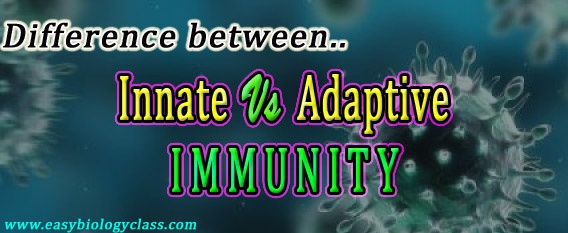Innate vs Adaptive Immunity
Difference between Innate and Adaptive Immunity: The main function of immune system in our body is to prevent or resist infections by pathogenic microorganisms. The immune system in an organism is initiated with the recognition of the invading microorganism.
The immunity against the invading microbes shown by our body can be grouped into two broad categories – (1) Innate Immunity and (2) Adaptive Immunity. These two immune systems act together to defend the body against infections and diseases.
(1). Innate Immunity:
It is also called the Native Immunity. Innate immunity is the nonspecific resistance that an individual possesses by birth. This immune system operates through physical barriers such as skin, chemical in the blood and by immune cells. The innate immunity is due to the genetic makeup of the organism and it does not require the prior contact with microorganisms. The innate immunity acts as the very first level of defense system in our body.
(2). Adaptive Immunity:
It is also called as Acquired Immunity or Antigen Specific Immunity. It is the specific resistance acquired by an individual during its life and it is mediated by B- and T- lymphocytes after exposure to specific antigen. The adaptive immune system is characterized by the formation of antibodies (immunoglobulins) and immunological memory.
| You may also like NOTES in... | ||
|---|---|---|
| BOTANY | BIOCHEMISTRY | MOL. BIOLOGY |
| ZOOLOGY | MICROBIOLOGY | BIOSTATISTICS |
| ECOLOGY | IMMUNOLOGY | BIOTECHNOLOGY |
| GENETICS | EMBRYOLOGY | PHYSIOLOGY |
| EVOLUTION | BIOPHYSICS | BIOINFORMATICS |
The following table compares the difference between Innate (Native) Immunity and Acquired (Adaptive) Immunity.
Difference between Innate and Adaptive Immunity
Sl. No. Innate Immunity
(Native Immunity)
Adaptive Immunity
(Acquired Immunity)
1 Definition: The resistance to microbial infection that an individual possess by virtue of its genetic makeup. Definition: The resistance acquired by an individual during its life.
2 Innate immunity is classified into specific and non-specific immunity. Adaptive immunity is classified into Active and Passive immunity.
3 Innate immunity is orchestrated through phagocytes (Macrophages, and Neutrophils) and Natural Killer cells. Adaptive immunity is orchestrated through Lymphocytes.
4 The antimicrobial system of the innate immunity is shown by complement, leukins, plakins, lactic acid, lactoperoxidase and interferon The antimicrobial system of the Adaptive immune system is shown by antibodies (immunoglobulins).
5 Skin and mucosal epithelia acts as the physical barriers in innate immunity. Lymphocytes in the epithelia acts ash the physical barriers in Adaptive immunity.
6 Antimicrobial chemical acts as the chemical barriers. Antibodies secreted by B-cells acts as the chemical barrier.
7 No immunological memory. Possess immunological memory.
8 Repeated exposures bring response like primary response due to the absence of memory. The secondary response is much quicker due the presence of immunological memory.
9 Specificity is very less. Specificity is very high.
10 Shows specificity for structures shared by groups of related microbes. Shows specificity towards the antigens (microbial or non-microbial).
11 Innate immunity develops very quickly (within hours). Adaptive immunity requires many days to develop.
12 Potency of innate immunity is comparatively very less. The potency of adaptive immunity is very high.
13 Innate immunity is genetically fixed and thus it can be transferred to progeny. Adaptive immunity is not genetically fixed and thus it cannot be transferred to the progeny.
14 Innate immunity is always kept on. Adaptive immunity is usually kept silent, switched on when it contacts a foreign antigen.
You may also like…
@. Difference between Cell-mediated and Humoral Immunity
@. Difference between Active and Passive Immunity
@. Why Antibodies are called as Immunoglobulins?
@. Immunoglobulin – Structure and Properties
